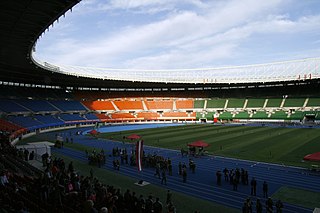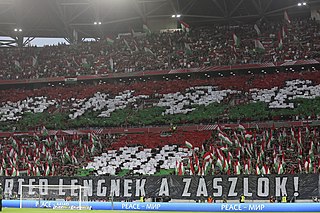A total of 37 teams entered the 1938 FIFA World Cup qualification rounds, competing for a total of 16 spots in the final tournament. For the first time the title holders and the host country were given automatic qualification. Therefore, France, as the hosts, and Italy, as the defending champions, qualified automatically, leaving 14 spots open for competition.

The 1970–71 season of the European Cup club football tournament was won by Ajax in the final against Panathinaikos. It was the first time the cup went to Ajax, beginning a three-year period of domination, and the second consecutive championship for the Netherlands. Feyenoord, the defending champions, were eliminated by Romanian club UTA Arad in the first round.

The 1989–90 European Cup was the 35th edition of Europe's premier club football tournament, the European Cup. The final was played at the Praterstadion in Vienna on 23 May 1990. The final was contested by Italian defending champions Milan and Portuguese two-time former winners Benfica. Milan successfully defended their title with a 1–0 victory, securing their fourth European Cup trophy. Milan remained the last team to successfully defend their trophy until Real Madrid did it again in 2017. Arsenal were denied a place in the competition, as this was the last year of a ban from European competitions for English clubs following the Heysel Stadium disaster of 1985.
The 1990–91 season of the European Cup Winners' Cup was won by Manchester United against Barcelona. The victory for United was significant as it was the season English clubs returned to European football, after completing a five-year ban as a result of the Heysel Stadium disaster.
The 1988–89 season of the European Cup Winners' Cup was won for the third time by Barcelona in the final against Italian entrants Sampdoria. The two sides would meet again in the 1992 European Cup Final, which Barcelona also won. Wimbledon did not participate due to UEFA's five-year ban on English clubs from European competition. The defending champions Mechelen were eliminated in the semi-finals by eventual runners-up Sampdoria.
The 1988–89 UEFA Cup was won by Napoli over Stuttgart.
The 1987–88 UEFA Cup was won by Bayer Leverkusen on penalty kicks over Español.
The 1985–86 UEFA Cup was the 15th season of the UEFA Cup, an annual club football tournament organised by UEFA. It was won by Real Madrid, who beat 1. FC Köln 5–3 on aggregate in the final. It was the first season in which English clubs were serving an indefinite ban from European football competitions, which meant two-time UEFA Cup winners Liverpool and Tottenham Hotspur, as well as Southampton and Norwich City were unable to compete.
The 1979–80 UEFA Cup was the ninth season of the UEFA Cup, a football competition organised by UEFA for clubs representing its member associations. The competitions was won by Eintracht Frankfurt, who beat Borussia Mönchengladbach on the away goals rule after a 3–3 aggregate draw in the final. All four semi-finalists came from West Germany, and a fifth was eliminated in the quarter-finals. This is the only time all four semi-finalists in a UEFA club competition came from a single nation.
The 1976–77 UEFA Cup was the sixth season of the UEFA Cup, a club football competition organised by UEFA. It was won by Italian club Juventus, who beat Athletic Bilbao of Spain in the two-legged final; both sides won one leg of the tie, which finished 2–2 on aggregate, but Juventus' solitary goal in the second leg at San Mamés Stadium in Bilbao saw them win on away goals. It was the first time that a team from Southern Europe had won the competition.
The 1973–74 UEFA Cup was the third season of the UEFA Cup since its inception in 1971. It was won by Dutch side Feyenoord who defeated English side Tottenham Hotspur 4–2 on aggregate after two matches.
The 1929–31 Balkan Cup was the competition's first edition. Four teams participated: Romania, Greece, Yugoslavia, and Bulgaria. Romania won the trophy ahead of second placed Yugoslavia. Greece came third and Bulgaria was last. The best goalscorers were Bodola and Wetzer, both from Romania and with 7 goals each. Albania had registered for the tournament, but retired before the beginning and did not participate.
This article details the 2006–07 UEFA Cup qualifying rounds.
The 1947 Balkan Cup, officially called the Balkan and Central European Championship, was played between May and October 1947 between Albania, Romania, Bulgaria, Yugoslavia and Hungary. It was Hungary's first participation in the tournament, in which it won all the matches.
The 1931–1934 Central European Cup for Amateurs was the second and last edition of the Central European International Cup for amateur teams. It was won by Romania, who took part for the first and only time.

The Hungary–Romania football rivalry is a competitive sports rivalry that exists between the national football teams of the two countries and their respective sets of fans.
The 1948–53 Central European International Cup was the fifth edition of the Central European International Cup played between 1948 and 1953. It was played in a round robin tournament between five teams involved in the tournament.
The 1973–76 Balkan Cup was the 11th Balkan Cup football tournament. It was the first tournament played in a knockout system with semi-finals and finals. It was played between April 1973 and November 1976 between Turkey, Romania, Bulgaria and Greece. The tournament was won by Bulgaria over Romania via the away goal rule, the score being 3–3 in the two legs of the final. The top goalscorer was Cemil Turan from Turkey with 4 goals.
The 1977–80 Balkan Cup, was the 12th Balkan Cup football tournament. It was the first to have a group stage involving the five teams split into two groups, one of three teams and the other of two, with the winner of each one meeting in the final. It was played between February 1977 and August 1980 between Turkey, Romania, Bulgaria, Yugoslavia and Greece. The tournament was won by Romania the general score being 4–3 against Yugoslavia in the two legs of the final. The top goalscorer was Anghel Iordănescu from Romania with 6 goals.
The King Alexander's Cup or Friendship Cup was an international football competition contested by the national teams of Romania and Yugoslavia. The tournament was named after Alexander I, the King of Yugoslavia and was organized to celebrate the wedding of King Alexander I of Yugoslavia with the Princess Maria of Romania, the event being announced by the Romanian newspaper, Ecoul Sportiv on 28 May 1922: "On the occasion of the marriage of His Majesty King Alexander I with Her Royal Highness Princess Maria of Romania, His Majesty was pleased to donate a cup that will bear his name, to encourage the progress of the football-association sport in his country and in the country of his wife. This cup will be a challenge and will go definitely to the country which will win it three times in a row or five times in total." The 1936, 1937 and 1939 editions were called King Carol's Cup, after Carol II of Romania and the last edition was called King Mihai Cup named after Mihai of Romania. Between 1937 and 1938, the regular Friendship Cup played between Romania and Yugoslavia was extended to include Czechoslovakia for an mini tournament called Eduard Benes' Cup named after Edvard Beneš, the president of Czechoslovakia.


